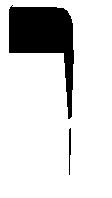My favorite, it’s time for a scribal oddity. God gives Pinchas his covenant of peace:
The last word, Shalom, peace has a scribal curiousity. The vav in that word is severed
פינחס בן־אלעזר בן־אהרן הכהן השיב את־חמתי מעל בני־ישראל בקנאו את־קנאתי בתוכם ולא־כליתי את־בני־ישראל בקנאתי: לכן אמר הנני נתן לו את־בריתי שלום:
(Numbers 25:11-12). “Because Pinchas turned my wrath from Israel, and was zealous for My zealousness toward them and I didn’t obliterate them in My zeal. Therefore I say that behold I give him my covenant of peace.”
 This peace is somehow broken, somehow diminished and comes at a great price. “Freedom isn’t free, it costs folks like you and me”, we learn in the movie Team America: World Police. This I believe is the only broken letter in the entire Bible and if it is not drawn as broken, then the entire Torah scroll is disqualified. There must be some real importance to this little broken letter.
This peace is somehow broken, somehow diminished and comes at a great price. “Freedom isn’t free, it costs folks like you and me”, we learn in the movie Team America: World Police. This I believe is the only broken letter in the entire Bible and if it is not drawn as broken, then the entire Torah scroll is disqualified. There must be some real importance to this little broken letter. Maybe this is a commentary that can apply today. This peace that Pinchas secured was only able to be obtained after bloodshed. Our freedom at Passover came at the cost of the Egyptians, who we recognize by spilling wine at the mention of the plagues that led to their downfall and truncating our Hallel praises on the latter days of Passover in commemoration of their drowning defeat at the Sea of Reeds. In the case of Pinchas, God’s wrath only abates after Pinchas kills people that intermarried. I think today that, although Israel only wants to dwell peacefully, as it has forever (such as in the fast day afternoon’s Haftarah which we just read (Isaiah 55:12), about better times when “you shall dwell in peace”) our neighbors will not let us exist as such (some don’t think we should exist at all or that we do exist at all) and we must fight for our survival in order to secure peace.
Also contained in this parasha is the story of Tzelophchad’s daughters. Tzelophchad is a man who died in the desert and according to Rabbinic Tradition he is the “some guy” who God ordered stoned to death for gathering sticks on the Sabbath. He left behind only daughters and when the geneology was discussed and the laws of succession and inheritance set, the daughters of Tzelophchad complained to Moses because only sons inherit. Moses consults with God for a judicial decision he doesn’t know the answer to, I believe, only three times in the Torah, in this case, in the aforementioned case of the guy gathering sticks, and in the case of impure people who are unable to offer the pascal lamb during the prescribed time. It is this case of the daughters being able to inherit and own land that I find revolutionary for the time. Although their rights are very limited compared to them, this is possibly the first case in ancient history of women being able to be landowners. We see time and time again that God is especially merciful and caring about the destitute, the stranger, the orphan, the widow, the sick, and this shows that in a world that in some cases to this day is male dominated, and completely male dominated until very recently, there is a glimmer of hope for women and for others who are not seen as the so-called upper echelons of society. Judaism doesn’t have to be a Plutocracy where only the rich are in power; though the Talmud suggests the High Priest should be wealthy there have been High Priests who have been extremely poor, and his collegues are supposed to help him get around that law by furnishing him with money. One of the most famous High Priests, Joshua, in one of my favorite haftarot, is seen as having torn dirty clothing and being extremely poor. Satan tries to accuse Joshua and God denounces Satan and gives Joshua clean clothing becoming of a high priest. Half of the prayers we say at the beginning of the morning service are dedicated to God’s taking up the plight of the destitute, “Blessed are You Lord our God King of the Universe who restores sight to the blind… clothes the naked… raises up the bent… gives strength to the weary…” introduce our service in Birkot HaShachar. “God protects the convert, relieves the orphan and the widow” we find in Psalms 146:9. Even in terms of Tzedakah which we are commanded to immerse ourselves in, we are commanded to perform it while maintaining the highest possible dignity for the poor we help, and the highest form of Tzedekah is helping someone find gainful employment so they no longer have to perform the embarrassing task of begging and panhandling. We don’t watch when the poor gather from the corners of our field to protect their dignity. Even the poorest of the poor must give Tzedekah, poverty isn’t an excuse in Judaism to not do acts of kindness and it is a great boost of self-esteem to be able to help others, regardless if you are the poorest person in the world.
No comments:
Post a Comment